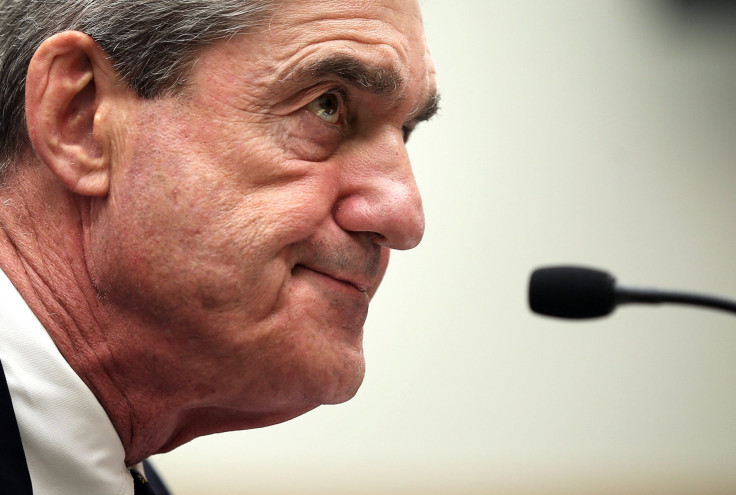Mueller Report: New Book Says Special Counsel Prepared Trump Obstruction Document, Then 'Shelved' It

A new book from best-selling author Michael Wolff, who previously chronicled the first year of the Trump administration, said Special Counsel Robert Mueller kept a three-count obstruction of justice indictment against President Trump on his desk for nearly a year before shelving it, a claim flatly denied by a Mueller spokesman.
The incendiary claim is contained in Wolff’s "Siege: Trump Under Fire," to be published June 4.
The book is a sequel to "Fire and Fury," the 2018 bestseller chronicling what has been characterized as dysfunctional White House after Trump took office. While "Fire and Fury" was criticized for its harsh treatment of the president’s first year of residency, many of the assertions in the book were later proven true, most notably in another book, "Fear: Trump in the White House," written by Watergate reporter Bob Woodward.
A copy of Wolff’s new book was obtained by the Guardian and the underlying documents examined. In a writer’s note, the Guardian reported Wolff said his findings were “based on internal documents given to me by sources close to the Office of the Special Counsel.” But a spokesman for the Mueller team, Peter Carr, told Guardian reporter, Edward Helmore, “The documents that you’ve described do not exist.”
Exclusive: Mueller drew up obstruction indictment against Trump, Michael Wolff book claims https://t.co/u3sruvrZK9
— Guardian US (@GuardianUS) May 28, 2019
Wolff’s earlier book resulted in the firing of Trump's strategist Stephen Bannon, who served as Wolff’s source. Bannon also was banished from Breitbart News after "Fire and Fury" sold nearly 5 million copies.
The authenticity of the documents underlying Wolff’s latest revelations will no doubt fuel debate around the eagerly awaited sequel.
Mueller’s report was delivered to Attorney General William Barr in April after Mueller spent nearly two years investigating whether Russian operatives tampered with the 2016 presidential election. A redacted version of the report was supplied to Congress and has been the source of much controversy and legal wrangling for access to a full copy. Under threat of congressional enforcement action as recently as last week, Barr has agreed to release a less-redacted version of Mueller’s report to lawmakers.
Amash accuses Barr of deliberately misrepresenting Mueller’s report to protect Trump https://t.co/PWrQvDTK09
— The Washington Post (@washingtonpost) May 28, 2019
The Guardian reported that Wolff contends Mueller’s office drew up a three-count outline of presidential abuses, under the heading “United States of America against Donald J. Trump, Defendant.”
The Mueller Report did not find evidence of a conspiracy between Russian operatives and the Trump campaign but it did outline 11 possible instances of obstructing justice by the administration and indicated Congress should determine the next steps.
The documents reviewed by the Guardian listed a first count, under Title 18, United States Code, Section 1505, charging the president with “corruptly – or by threats of force or threatening communication – influencing, obstructing or impeding a pending proceeding before a department or agency of the United States.”
A second count, “under Section 1512, charged the president with tampering with a witness, victim or informant.” A third count, under Section 1513, “charged the president with retaliating against a witness, victim or informant.”
The draft indictment also related what Mueller considered to be the “extraordinary lengths” the president took “to protect himself from legal scrutiny and accountability, and to undermine the official panels investigating his actions,” Wolff writes.
Donald Trump reasserted his claim that he's the "most transparent" President.
— CNN (@CNN) May 26, 2019
Facts first: He's refused to release his tax returns, has battled congressional subpoenas for his financial information and refused to be interviewed in person by Mueller's team https://t.co/DJ2blPzZqG
According to the Guardian, Wolff also writes about the “tortured deliberations” undertaken by Mueller in determining whether to charge the president, and if he did so whether the president had the power to dismiss him, or his boss then-Deputy Attorney General Rod Rosenstein. In the end, Wolff argues, Mueller blinked but had his team disseminate their work to other prosecutorial bodies, leading to 13 investigations that resulted in cooperating witness plea deals with Michael Cohen, Trump Organization accountant Allen Weisselberg, and David Pecker of American Media.
Regarding Mueller’s rationale to defer prosecuting the president, Wolff writes, the former FBI director and U.S. Attorney did not reach the top echelons of government “by misconstruing the limits of bureaucratic power.”
Bannon also occupies considerable space in the new one. His take on Mueller’s handling of the investigation: “Never send a marine to do a hit man’s job.”
Ultimately, Wolff arrives at a sobering conclusion. “Bob Mueller threw up his hands. Surprisingly, he found himself in agreement with the greater White House: Donald Trump was the president, and, for better or for worse, what you saw was what you got – and what the country voted for.”
In the final analysis, Wolff argues, Mueller recognized “that while the president had the support of the majority party, he had the winning hand.”
© Copyright IBTimes 2024. All rights reserved.





















